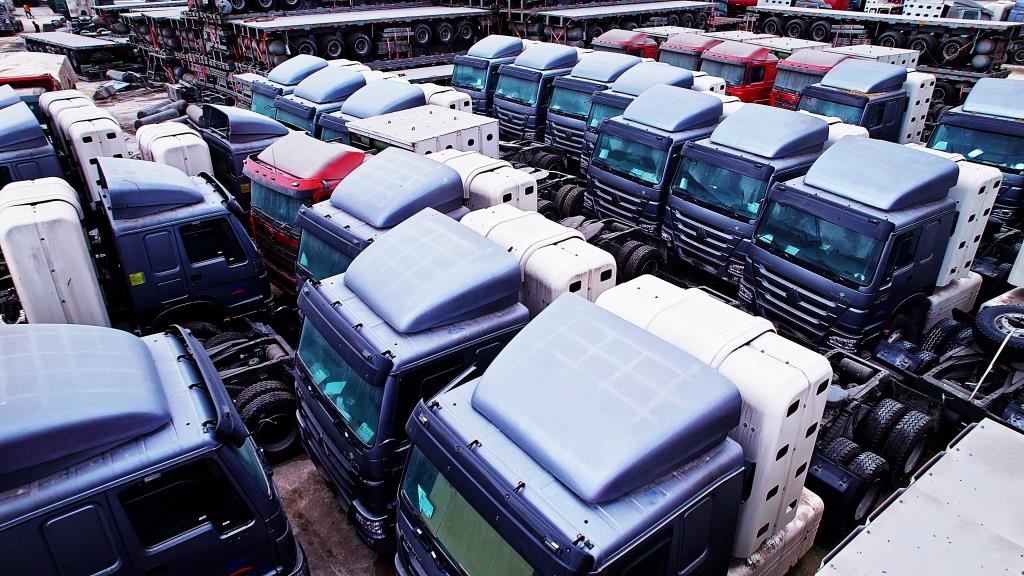Auto
The Economic Consequences of Informality in the Transport Sector

By Timi Olubiyi, PhD
The new year is here, it is my prayer that 2022 will be a profitable year for all individuals, businesses, and households. Our new year resolutions at every level must include enhancing productivity and improving performance.
Without a doubt, transportation is central to this and can be an effective indicator of performance in any economy, business, and quality of life. Simple things like getting to work, school, meetings, appointments, trade facilitation, transacting, moving cargoes, travels, and even delivery of social services such as rescues during emergencies can become extremely difficult with poor transportation.
In fact, business decision-making and access to everything for economic progress hinge strongly on effective transportation I must say.
Certainly, every nation regardless of its population size, level of development, and industrial capacity can benefit from an efficient transportation network be it road, waterways, rail, or air transport. But on the contrary transport poverty exist where inefficiency in all transportation modes is prevalent within an economy. Such is the case in many African countries and cities, including, Benin, Ethiopia, Nigeria, Uganda, Tanzania and Lusaka, Zambia, and a host of others.
In many of the developed countries, transportation plays a significant role in the ease of doing business and the government plays an integral role in the implementation and administration. A recent visit to the United Kingdom (UK) and the United Arab Emirates (UAE) strongly indicated that, where there is efficient transportation and fewer traffic congestions, the economy and businesses are positively impacted.
From my observation in the two countries, public transportation which includes buses, taxis, water ferries, trains, trams, and the metros are regulated adequately by the government and it is not completely private-sector driven, making it so efficient and reliable. Apparently as noted, where private companies are involved in the operations, it is usually on an agreed model such as the Public-Private Partnership (PPP) model.
Ironically, across many African cities particularly in my country Nigeria, the unreliability of the transport system has continued to limit access to services, business, trade facilitation, the attraction of foreign direct investments, and also in the revenue drive of the government.
The pilot region of observation is Lagos State the economic centre of Nigeria, where transport operation is largely run informally by private individuals. This makes the services undesirable because of the inefficiencies that exist due to under-regulations.
For instance, car reliance keeps compounding in the State because of poor demand responsiveness of public transports, commuters then tend to avoid the long queues and waiting hours at bus stops, and the associated risk of using public minibuses called Danfo. But the result is usually wastage of productive hours by many commuters in traffic congestions.
Sometimes, bike taxis which are usually referred to as Okada are considered for mobility. Though this trend depicts transport poverty, it is largely heightened by the informality of the public transport sector, widespread unemployment, lack of worthiness of the available transportations, lack of adequate maintenance system, giving rise to the high traffic congestion on the roads and expensive transport fares.
Basically, the over-reliance on one mode- road transport and over-exposure to informality are the issues that are mainly slowing down growths in the sector. As widely noted, private participation, with little or no government entry barrier promotes informality. Such as the operations of the non-conventional ferry on the waterways, motorized tricycles, and the Okadas and Danfos within the hinterlands. Sadly, these are the only affordable services to the poor despite the widespread insecurity and risks.
In the UK particularly in London, a mobile application (app) offers most of the information about the public transport system, and regulations in the city including fares, routes, and time of arrivals and departures. That means if you must operate government has to know, this procedure reduces informality. In both UK and UAE, the logistics and business supply chains are effective because they rely on the transportation infrastructures and strict regulations available and that reduces the cost of business operations.
For most public transportation closed-circuit television (CCTV) is installed for safety and security businesses. Transport cards are also used on most of these public transports for ease of payment, this offers a hassle-free environment for the populace, visitors, and tourists. Strict regulations also avail the government the opportunity to monitor many of these services, ensure accountability on the part of the operators, and for government to monitor service trends.
For instance, in UAE just in a year, there were around 600 million rides on public transport (in a city of 3 million population). This is an indication of the rate of conversion to the public system by visitors and residents in a region that used to be primarily private vehicle driven.
This is an indication that individuals move with ease and travel on public transportation because they are timely, affordable, and adequately available. With such a system in place, businesses can make projections and enjoy a reliable supply chain, with no uncontrollable logistic issues. With this experience, I have a strong conviction that there is a direct relationship, between the development of the transport system and the ease of doing business in any country.
In fact, without a doubt, it is easy to conclude that transportation can be a useful criterion for measuring development in a country. Because if transportation is made efficient it must impact positively on the economic development of a country and also improve the performance of the businesses in that country. It is no brainer or magic such a system can happen in Nigeria, with improved regulation, reduction of informality with sufficient investments in the sector.
Even though in Nigeria it has been a situation of hectic traffic congestion even at the ports, poorly maintained roads, overstressed railways, underutilization of the waterways, long hours of waiting to have access, inadequate infrastructure, there should be a concerted effort to raise the percentage of public transportation, expand the modes, and offer stricter regulatory regime.
For safety and security reasons, the ease of entry into the sector by informal transport operators needs to be reviewed because it appears that is majorly the issue. Government entry barriers are obstacles that can make it difficult for an individual or business to operate in the sector, such as what is available in the aviation industry.
It is important to improve policies and regulations in transport services, expand transportation networks to achieve large-scale economic growth, and modernization. Though it can be argued, effective transportation can alleviate the level of poverty in the country. Because the current chaotic congestions on the roads and in the ports are essentially aiding market failures and hindering the ease of doing business in the country which are enablers of business closures and impoverishment.
Hence, when transportation is effective and efficient, businesses will be able to make adequate projections, improve production, produce faster, reach consumers faster, attend business meetings promptly and all these stimulate the economy, create jobs, and can reduce poverty.
Truthfully, the transportation sector can offer the needed diversification of the revenue generation drive of the government. I am aware that the current public debt of the country is around N38 trillion, according to figures released by the Debt Management Office (DMO) and this is mainly due to revenue challenges. In my opinion, an effectively regulated and efficient transportation system can be revenue-yielding for the government.
In conclusion, it is also important to note that an improved transportation mode- air, rail, water networks and the expansion of road networks can increase economic productivity, cut the cost of production, and enhance the ease of doing business in the country. For thinkers, the issues mentioned above can adequately present mind-blowing opportunities, particularly for investors and businesses. To this end, businesses and individuals can have better mobility, access and livelihood. Good luck!
How may you obtain advice or further information on the article?
Dr Timi Olubiyi, an Entrepreneurship & Business Management expert with a PhD in Business Administration from Babcock University Nigeria, is a prolific investment coach, seasoned scholar, Chartered Member of the Chartered Institute for Securities & Investment (CISI), and Securities & Exchange Commission (SEC) registered capital market operator. He can be reached on the Twitter handle @drtimiolubiyi and via email: [email protected], for any questions, reactions, and comments.
Auto
Heirs to Introduce Low-Cost Motor Insurance

By Modupe Gbadeyanka
There are plans by Heirs Insurance to introduce insurance products tailored for vehicle owners, a statement from the underwriting firm has disclosed.
According to the subsidiary of Heirs Holdings, this low-cost motor insurance package known as the Flexi Comprehensive Motor Insurance Plan will provide the benefit of a comprehensive motor insurance plan for a fraction of the cost, addressing the financial realities many Nigerians face.
The underwriting company announced the plan to introduce this package as it launched a new campaign designed to reward its customers.
This initiative themed Unwrapping Smiles will bring hope to individuals, families, and communities this holiday season, and will run from December 10 to December 31, 2024.
It will feature community-focused outreaches, including Christmas gifts and exciting rewards to put smiles on the faces of Nigerians. It will also include the launch of a holiday-watch web film known as The Underwriters for all Nigerians to enjoy.
“At Heirs Insurance Group, we are committed to providing much more than insurance. In a season when many Nigerians seek hope and reasons to smile, we are proud to offer initiatives that inspire and uplift,” the Chief Marketing Officer of Heirs Insurance, Ms Ifesinachi Okpagu, said.
Auto
FG Claims Investments in Presidential CNG Initiative Now $450m

By Adedapo Adesanya
Nigeria’s Presidential Compressed Natural Gas Initiative (PCNGi) claims that investments in championing the CNG value chain have hit $450 million.
This was disclosed by Mr Michael Oluwagbemi, Project Director and Chief Executive Officer (CEO), PCNGi, during the 9th Edition of the Nigeria Energy Forum (NEF2024) Day 2, Virtual Event themed Energising Sustainable Industrialisation.
According to the PCNGi CEO, the amount goes into things like mother stations, daughter stations and refuelling stations as well as conversion centres which are starting to spring up across the nation.
Mr Oluwagbemi, represented by Mr Tosin Coker, the Head of Commercial, PCNGi, said the initiative had successfully converted more than 10,000 vehicles from petrol to CNG.
“By 2027, the initiative will have converted more than one million vehicles using petrol to CNG,” he said.
On incidents of explosion of vehicles using CNG, the CEO assured Nigerians that it had taken precautionary measures with different agencies of government to ensure safety.
Mrs Ibironke Olubamise, National Coordinator of the GEF Small Grants Programme (SGP), managed by UNDP, said the SGP was investing in youth energy innovation for economic growth and environmental sustainability.
Mr Daniel Adeuyi, NEF Group Chairman, said, “The event featured three super sessions on Energising Industrial Revolution, Community Climate Action by GEF-SGP UNDP and Clean Energy Innovations.
“The sessions are to share lessons learnt from real-life projects and build capacity of young entrepreneurs and cross-industry professionals.”
Mr Joseph Osanipin, the Director General of the National Automotive Design and Development Council (NADDC), said that the council had trained more than 4,000 auto technicians on how to convert petrol vehicles to CNG.
He said the council had started campaigns to sensitise Nigerians on the advantages of using CNG to power their vehicles.
“CNG can guarantee a cleaner environment, it is cheaper and affordable,” he said.
Mr Oluwatobi Ajayi, the Chairman and Managing Director of Nord Automobile Ltd., said the company was established to tackle the growing demand for vehicles in Africa and reduce import dependency.
He said that because of the Federal Government’s CNG initiative, the company had incorporated it into their vehicle production to meet up with the government policy.
Mr Armstrong Tankan, the Managing Director and Chief Executive Officer, Ministry of Finance Incorporated (MOFI), said that MOFI was set up in 1959 as the statutory vehicle to hold all the assets owned by the federal government.
“Today, we’ve been able to identify the assets the federal government owns and we are trying to track them.
‘We actually do have assets, not just locally but globally as well and we must establish visibility over what the federal government owns before we can start talking about managing them.
“So, we want to try to minimise the waste, minimise the overlaps and help to improve output,” he said.
Auto
Dangote Becomes Largest Operator of CNG Trucks With $280m Investment

By Aduragbemi Omiyale
Over $280 million has been invested by Dangote Cement Plc in compressed natural gas (CNG) technology and infrastructure to enhance energy efficiency and drive economic growth in Nigeria.
The cement maker turned to CNG in demonstration of its support for President Bola Tinubu’s drive for cheaper and cleaner fuelling alternatives for all Nigerians.
At a recent event, the President emphasised the urgent need for Nigeria to utilise its vast natural gas resources in the transportation sector.
He stated that CNG transportation is an economic necessity for Nigeria, signalling a significant shift in the country’s approach to public transportation and energy use.
This has spurred Dangote Cement to adopt CNG, reflecting its dedication to mitigating climate change and supporting a transition to a low-carbon economy, making it the largest operator of CNG trucks in the country.
The chief executive of Dangote Group, Mr Aliko Dangote, said his company’s investments in CNG are also in line with Nigeria’s Nationally Determined Contribution (NDC) under the Paris Agreement, which aims for net-zero emissions by 2060.
“In this pursuit of transition to clean energy, we are optimistic of a remarkable accomplishment by President Tinubu, as he has taken the lead in the nation’s drive towards energy efficiency. This presupposes private sector intervention to support this noble idea initiated by the President,” he stated.
The businessman noted that the firm’s early adoption of CNG has made it the largest operator of CNG trucks in Nigeria, emphasising that the initiative is a boost to Mr Tinubu’s quest towards enhancing the nation’s energy independence and contributing to a more secure energy future.
“We are now using CNG vehicles, especially with the new policy of the federal government, launched under the Renewed Hope Agenda by President Tinubu. We are committed to a cleaner and greener future,” Mr Dangote said.
On his part, the chief executive of Dangote Cement, Mr Arvind Pathak, said the cement miller aims to acquire 100 per cent CNG trucks as part of a long-term plan to transition its entire fleet to CNG.
He disclosed that the CNG infrastructure investments have positively influenced Nigeria’s transition to cleaner fuels, adding that the CNG station at Obajana, capable of refuelling over 3,000 trucks, exemplifies this commitment, with a second station currently under development in Ibese to support fleet operations further.
“By mid-2026, Dangote Cement aims to operate a fleet predominantly powered by CNG. To facilitate this transformation, we are investing in expanding our CNG fuelling infrastructure, ensuring that our growing fleet has reliable access to CNG as our fuel,” Mr Pathak said.
He added that plans are afoot to aggressively pursue this timeline of deployment, beginning from the first quarter of 2025, saying, “We are keeping our eyes on the ball to ensure that we do not miss our target dates of full compliance.”
-

 Feature/OPED5 years ago
Feature/OPED5 years agoDavos was Different this year
-
Travel/Tourism8 years ago
Lagos Seals Western Lodge Hotel In Ikorodu
-

 Showbiz2 years ago
Showbiz2 years agoEstranged Lover Releases Videos of Empress Njamah Bathing
-

 Banking6 years ago
Banking6 years agoSort Codes of GTBank Branches in Nigeria
-

 Economy2 years ago
Economy2 years agoSubsidy Removal: CNG at N130 Per Litre Cheaper Than Petrol—IPMAN
-

 Banking2 years ago
Banking2 years agoFirst Bank Announces Planned Downtime
-

 Sports2 years ago
Sports2 years agoHighest Paid Nigerian Footballer – How Much Do Nigerian Footballers Earn
-

 Technology4 years ago
Technology4 years agoHow To Link Your MTN, Airtel, Glo, 9mobile Lines to NIN























